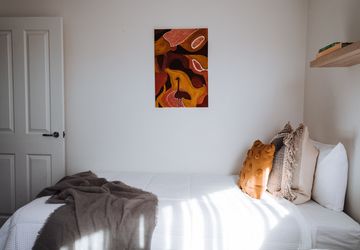Are you tired of tossing and turning through the night, desperately seeking the elusive embrace of slumber? It might not be your mind; that's the problem; it could be your sleep environment. Creating an ideal sleep haven can significantly impact the quality of your rest. So, let's embark on a journey to discover the secrets of optimizing your sleep environment for those blissful, restorative nights.
1. Harness the Power of Darkness

Darkness has become a rare commodity in a world where screens glow, and streetlights permeate even the darkest corners. Yet, it's essential for a sound sleep. Light suppresses the production of melatonin, the sleep-inducing hormone. To get the best out of your sleep, we recommend purchasing curtains to create a blackout in your room, as they don't let any light pass through them. Ensure that even the tiniest LED indicator is covered – every photon counts!
2. Embrace Serene Colors
Believe it or not, the colors in your sleep environment can influence your sleep quality. Soft, muted tones like blues, greens, and lavender have a calming effect that can help induce sleepiness. Think about repainting your bedroom walls or incorporating these colors into your bedding and decor.
3. Find Your Ideal Mattress and Pillow
Sleep quality is intrinsically linked to your comfort. If your mattress and pillow are older than you care to admit, it's time for an upgrade. The ideal mattress firmness varies from person to person, so consider testing a few options before making a decision. Similarly, your pillow should provide adequate support for your neck and head to avoid discomfort during the night.
4. Maintain a Comfortable Room Temperature
Your room shouldn’t be too cold or too hot, as says the Goldilocks rule. Otherwise, your body goes into survival mode and disrupts sleep. Keep the temperature just right, which should be between 60-67 degrees Fahrenheit (15-19 degrees Celsius). Experiment within this range to find what suits you best. A bedroom that's too hot or cold can disrupt your sleep cycle.
5. Say No to Clutter
A cluttered sleep environment can subconsciously contribute to stress and anxiety, hardly conducive to restful sleep. Keep your bedroom tidy and organized. Consider minimalist decor and ample storage solutions to avoid a chaotic atmosphere that might keep you awake at night.
6. Invest in Quality Bedding
Your bed should be a sanctuary of comfort. Opt for high-quality bedding that feels inviting. Choose soft, breathable materials for sheets and blankets to regulate your body temperature. A comfortable bedspread not only enhances your sleep environment but also beckons you to dive in and unwind.
7. Manage Noise Levels
Unwanted noise can be a sleep thief, disturbing your rest even if you're not consciously aware of it. So if you can train your brain to a sound like a fan or light music from earbuds you can familiarize yourself with, your body can block out other unwanted noises. If possible, address the source of noise to eliminate it.

8. Banish Electronics
Electronic devices have become integral to modern life, but they have no place in the sleep sanctuary. So if you use your mobile or computer screen before sleep, their blue light can interfere with sleep. It is because they are known to disrupt melatonin production. Most doctors and physicians recommend stopping viewing anything on these screens for at least an hour or two before bed.
9. Create a Relaxing Pre-Sleep Routine
Your sleep environment isn't just about the physical space; it's also about the habits you cultivate. Practice a relaxing routine before sleep, such as listening to a podcast or reading a book, and can even involve light nighttime yoga.
10. Consider Aromatherapy
Lavender, chamomile, and valerian are known for their soothing properties. You can use essential oils, sachets, or even scented candles to infuse your sleep environment with these calming aromas.
11. Mind the Bedtime Snacks
Don't eat heavy food before sleep; instead, choose or munch on snacks that are digested quickly. A small serving of whole-grain crackers or a banana can help stave off hunger without causing digestive issues.
12. Find Your Ideal Sleep Position
Your sleep environment isn't just about the external factors – your physical comfort matters too. Experiment with different sleep positions to find what feels best for you. Whether you're a back, side, or stomach sleeper, ensure your mattress and pillow adequately support your chosen position.

13. Harness Natural Light Exposure During the Day
Natural light is the most significant factor that improves your circadian rhythm regulation, so get as much as possible during the day. You will sleep better and awake energized when you have trained your body to align with the natural rhythm or internal clock.
14. Incorporate Relaxing Sounds
Soft, soothing sounds can create a tranquil atmosphere conducive to sleep. Consider using a white noise machine, nature sounds, or gentle instrumental music to drown out disturbances and lull yourself into a peaceful slumber.
15. Choose the Right Room Color
Earthy tones like soft greys and warm beiges can promote a calming ambiance. Avoid vibrant or jarring colors that might stimulate rather than relax your mind.
16. Optimize Your Bed Placement
The position of your bed within the room matters. Ideally, place your bed against a solid wall and avoid aligning it with doors or windows to create a sense of stability and security. This arrangement can promote a restful state of mind.
17. Mind the Humidity
Maintaining the right humidity level in your bedroom can prevent dry skin and irritated respiratory passages, ensuring you're not waking up due to discomfort. Consider using a humidifier or dehumidifier to achieve the optimal humidity level for your sleep environment.
18. Choose Comfortable Sleepwear
Your choice of sleepwear affects your comfort level during the night. Choose loose-fitting, breathable fabrics like cotton to help regulate your body temperature. Comfortable sleepwear can prevent overheating and excessive sweating, contributing to a more peaceful sleep.
Conclusion
A restful night's sleep isn't just a matter of luck. It's a combination of factors, with your sleep environment playing a pivotal role. By embracing darkness, prioritizing comfort, managing noise, and cultivating healthy sleep habits, you can transform your bedroom into a haven of relaxation and rejuvenation. Remember, the effort you put into optimizing your sleep environment will repay you with nights of restful slumber and days of enhanced well-being. Sweet dreams!
